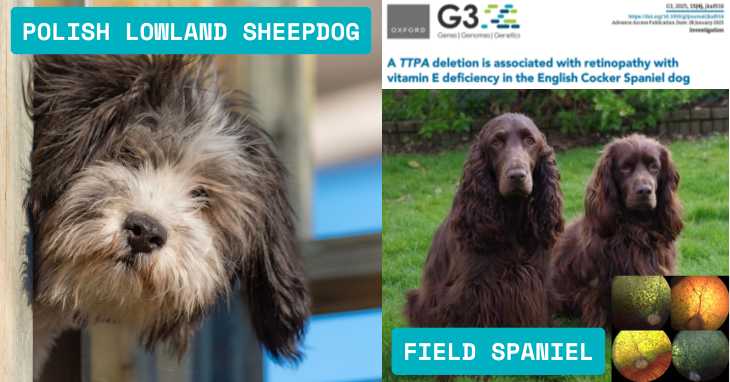
In January of this year we published our research into an inherited eye disease called retinopathy with vitamin E deficiency (RVED) in English Cocker Spaniels. You may have heard of this disease before under a different name, perhaps central progressive retinal atrophy or retinal pigment epithelial dystrophy. In the Cocker Spaniel the disease name was changed to RVED to reflect our new knowledge that the disease is an inherited form of vitamin E deficiency, causing retinopathy and in some cases neurological abnormalities. Vitamin E is extremely low in the RVED cases due to a recessively inherited variant in a gene that carries alpha-tocopherol, the most abundant form of vitamin E, around the body.
Central progressive retinal atrophy (CPRA)/retinal pigment epithelial dystrophy (RPED) has been reported in other breeds of dog. For these other breeds however, it has long been under discussion as to whether it is an inherited condition. We previously told you about our invaluable resource, our biobank, that contains thousands of DNA samples taken from a multitude of dog breeds and with varying disease status’. We went back through all of our data to see if we had any more samples from other dog breeds that had a diagnosis of CPRA or RPED by a veterinary ophthalmologist. We found we had a few cases, spanning the last two decades, of RPED in Field Spaniels and Polish Lowland Sheepdogs so we tested them for our TTPA variant and found that they all carried 2 copies.
As we said before in our article on the Cocker Spaniel, this is a good news discovery. This disease is treatable!. But we also really want to emphasise that we don’t want you rushing online to buy lots of vitamin E supplements for all of your dogs. If your dog is not deficient of vitamin E, giving a supplement could lead to vitamin E toxicity which is extremely harmful. You can test your dogs for our variant with a simple DNA test purchased from CAGT, even before any neurological or ophthalmological symptoms occur, and if they carry 2 copies of the variant, see your vet and ask for a vitamin E test and if it is confirmed to be low, your vet will advise as to how much supplementation is needed. Of course, dogs who have had a diagnosis of RPED/RVED can do the same. It really is important to get those vitamin E levels checked.
We have now amended the CAGT website to show these additional breeds who are affected with RVED and carry the new variant.

